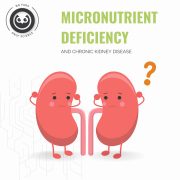Chronic Kidney Disease and how it affects micronutrient levels.
Chronic Kidney Disease (CKD) or chronic kidney failure is a result of when your kidneys have gradually lost their ability to filter out wastes and excess fluids from your body. The condition is usually progressive, and treatments include medications, dialysis and hemodialysis. Here’s a lesser discussed part of this touchy subject. How much of the excess fluids/wastes that are removed during these dialysis sessions are actually excesses or wastes? Are you losing something your body needs every time you go through a dialysis session? What are the side effects?
In this blog, we discuss the side effects of micronutrient deficiency that are very closely associated with CKD and dialysis. Read along, and keep yourself informed.
Kidney diseases and micronutrient deficiency – Where’s the correlation?
There’s always a correlation between nutrients and chronic illnesses. This correlation holds in good in both ways – You can develop complications and diseases if there’s chronic nutrient deficiency; and the nutritional balance in the body will be affected if you suffer from a chronic disease.
With respect to Chronic Kidney Disease, here are the reasons why your macronutrient balance is at risk –
- The dietary recommendations – There are a few dietary recommendations that people diagnosed with CKD will have to follow. These restrictions are aimed at reducing the intake of protein, phosphate, or potassium.
- Change in metabolism.
- Medications recommended for the condition.
- Other ailments and complications that you might be diagnosed with.
- The abdomen not being able to properly absorb nutrients.
- Excessive loss with urine and dialysate.
These are all potential reasons why people diagnosed with CKD might also have a micronutrient deficiency, and should be mindful of eating the rightful amount of everything that their body needs. This isn’t exclusive to later stages of CKD patients alone; but can pose a threat to people treating all stages of CKD.
What micronutrients are at the risk of loss?
- Vitamin C (Ascorbic acid) – Huge amounts of vitamin C are lost during dialysis. This is partly due to the process itself, and partly due to the vitamin getting oxidized to dehydro-ascorbic acid during hemodialysis.
- Vitamin B6 (Pyridoxine) – There’s a lot of controversy around the topic. CKD patients that received dialysis 35% drop in pyridoxine concentration. The study shows that vitamin deficiency was not observed in patients receiving 50 mg pyridoxine after each dialysis session. Conversely, in those CKD patients not receiving B6 supplementations, the B6 deficiency was found in 78%, 77%, 50%, and 34% of cases, respectively.
- Vitamin B9 (Folic Acid) – There’s a significant loss of folic acid every time there’s a dialysis session. Folate supplementation in a dose of 1 mg/day should prevent deficiencies in hemodialysis patients.
- Zinc – Deficiency of Zinc in the hair and skin is observed in people with CKD. Other tissues including erythrocytes (a red blood cell) have healthy amounts.
- Selenium – It’s a trace mineral. While even the general population has a deficiency due to poor dietary addition, people with CKD have it worse due to malabsorption.Needless to say, these are all important micronutrients. If you have CKD and you’re treating it, you’ll have to monitor and keep your micronutrient levels at a healthy level.
What should I do now?
First things first, understand the condition of chronic kidney disease, the treatment of kidney failure and their combined effect on your micronutrient levels. Do your own research and stop believing in hearsay. The ‘eight glasses’ trick does not work if you’re looking to clean your kidneys. Follow our space, talk to people from our team and keep yourself on the know about the condition and the implications.
Dietary restrictions
You will have to be regular with medications, because mostly these medications – though not completely – will provide doses of the micronutrients that are expected to be lost due to the condition or the treatment. So do not skip medications, stick to dietary instructions but make sure you get the recommended amount of nutritional intake. Avoid food with high salt and high potassium, and get a lot of your protein from sources like dairy and meat. Greens are essential too!
The next logical step would be arriving at a proper, tailor-made diet routine for you, and sticking to it. We can help you with it. The number of times we’ve heard people ask us, “I am on dialysis, can’t I have normal food anymore, at all?” gives us a rough representation of how ill-informed people are about the condition and the balanced approach they’d need towards food and diet. We can help you with that.
Get in touch, and follow ONP’s social handles for more such bite-sized updates about health, wellness, conditions and condition specific diet plans.



